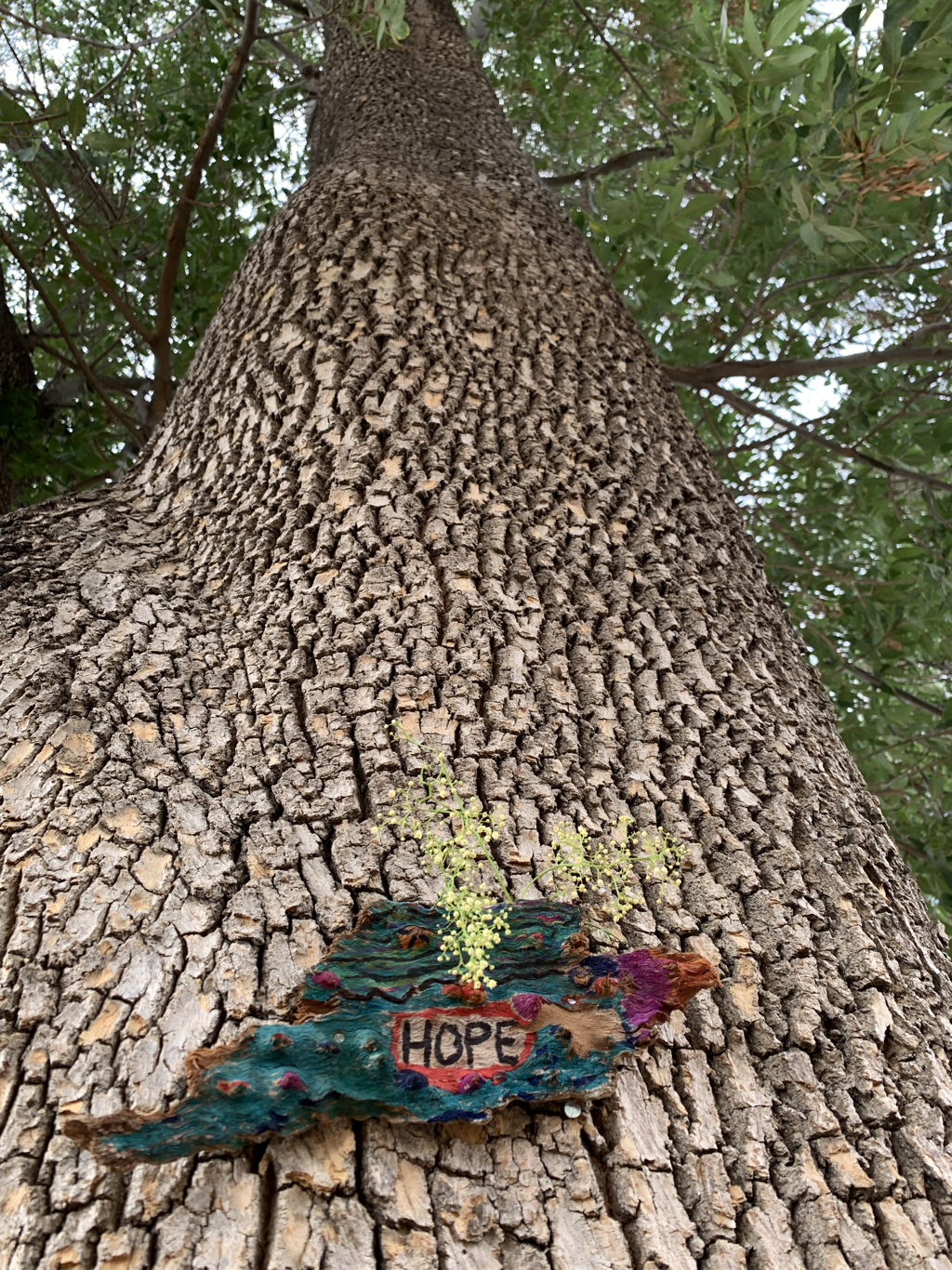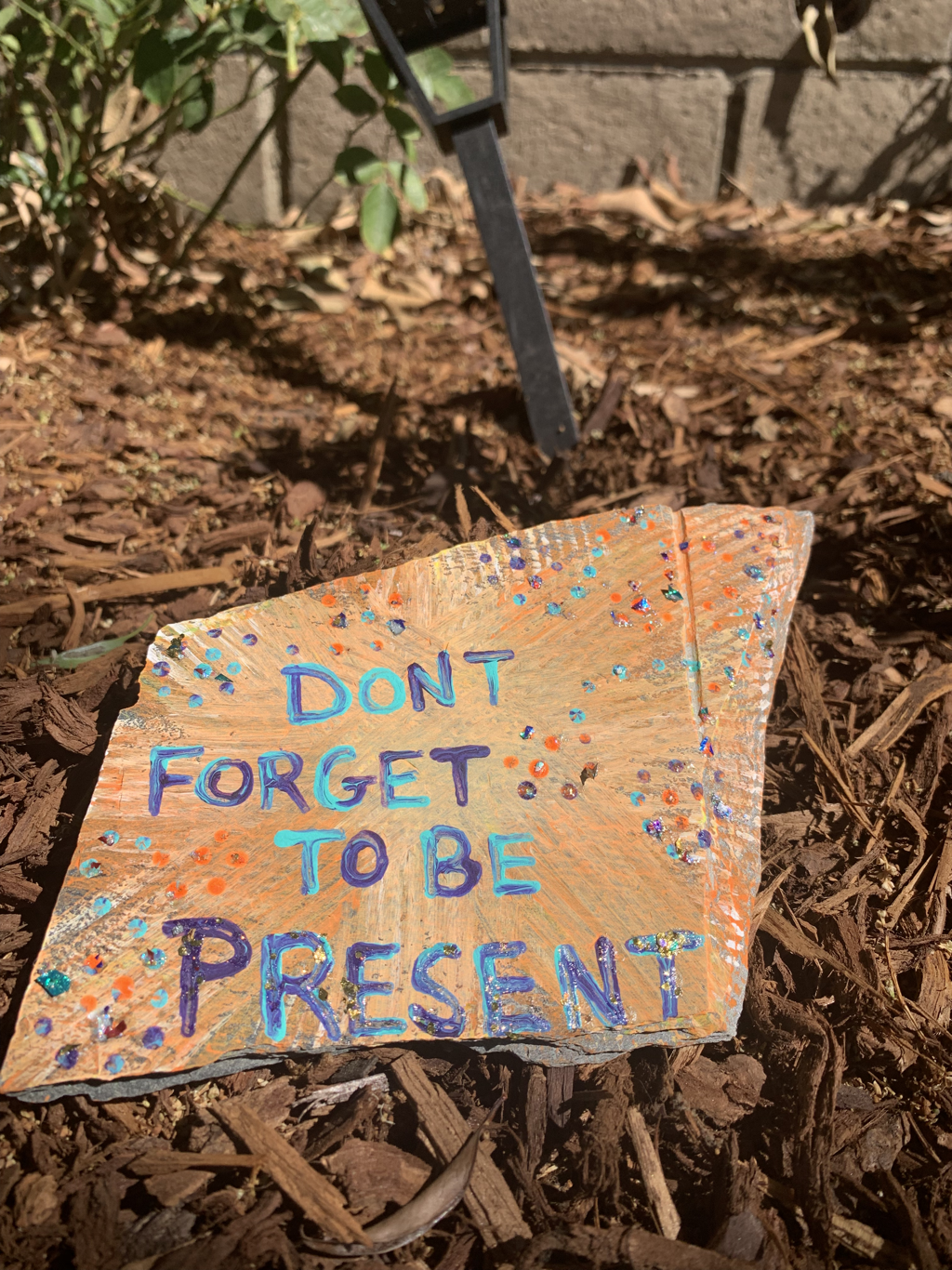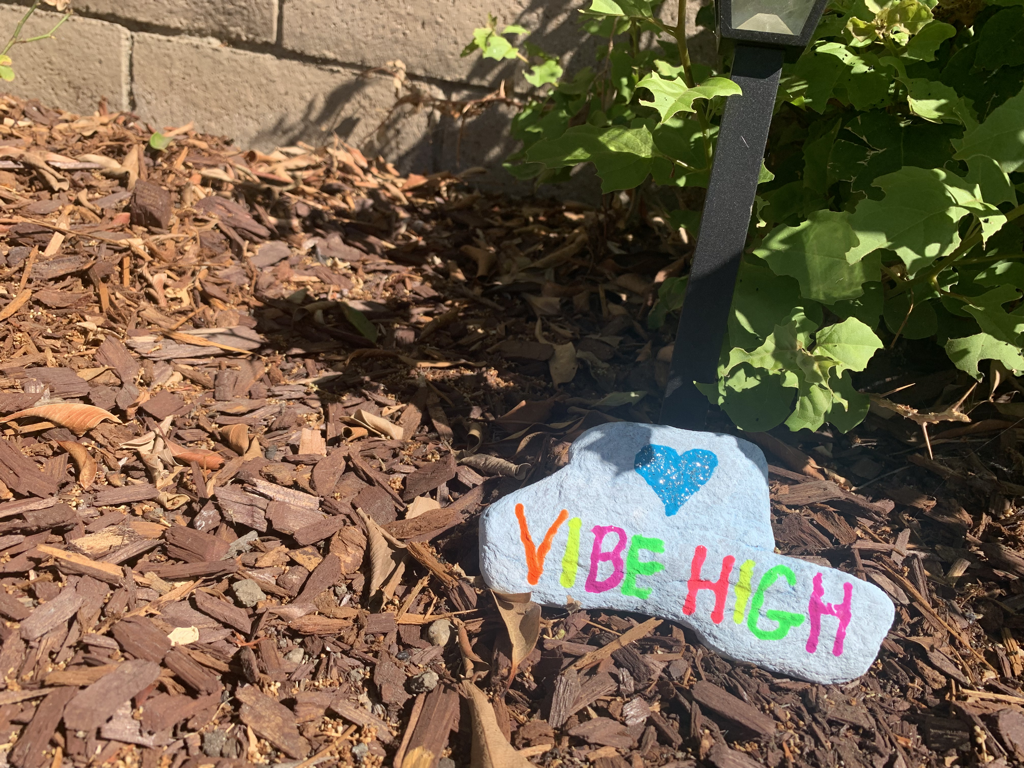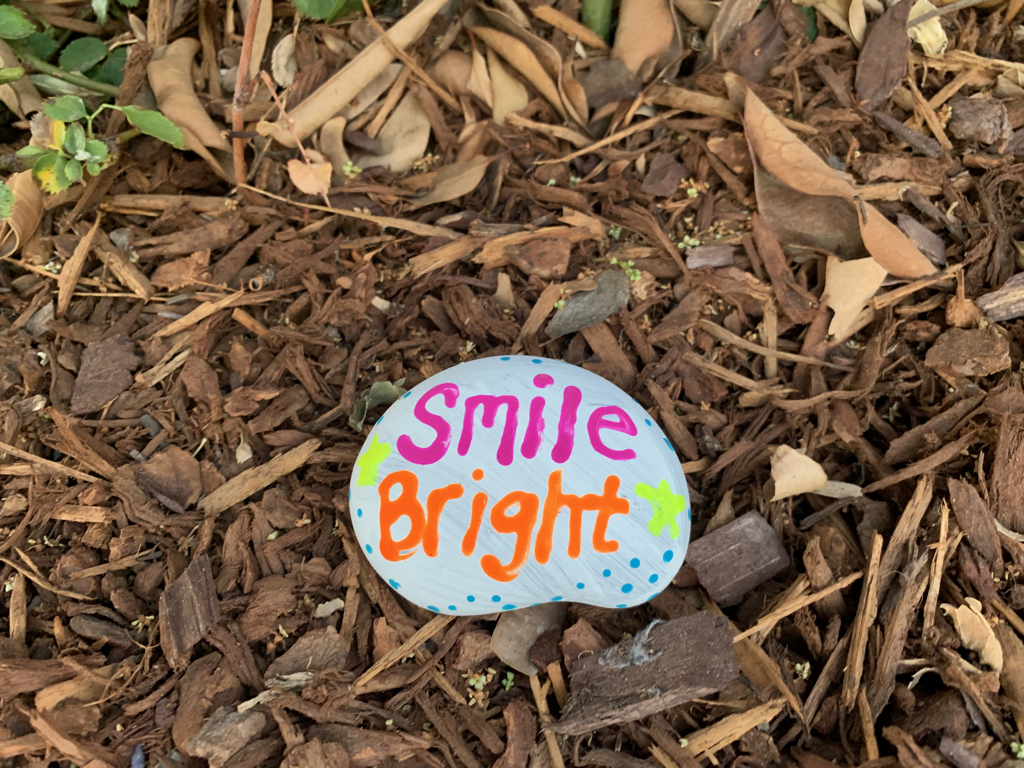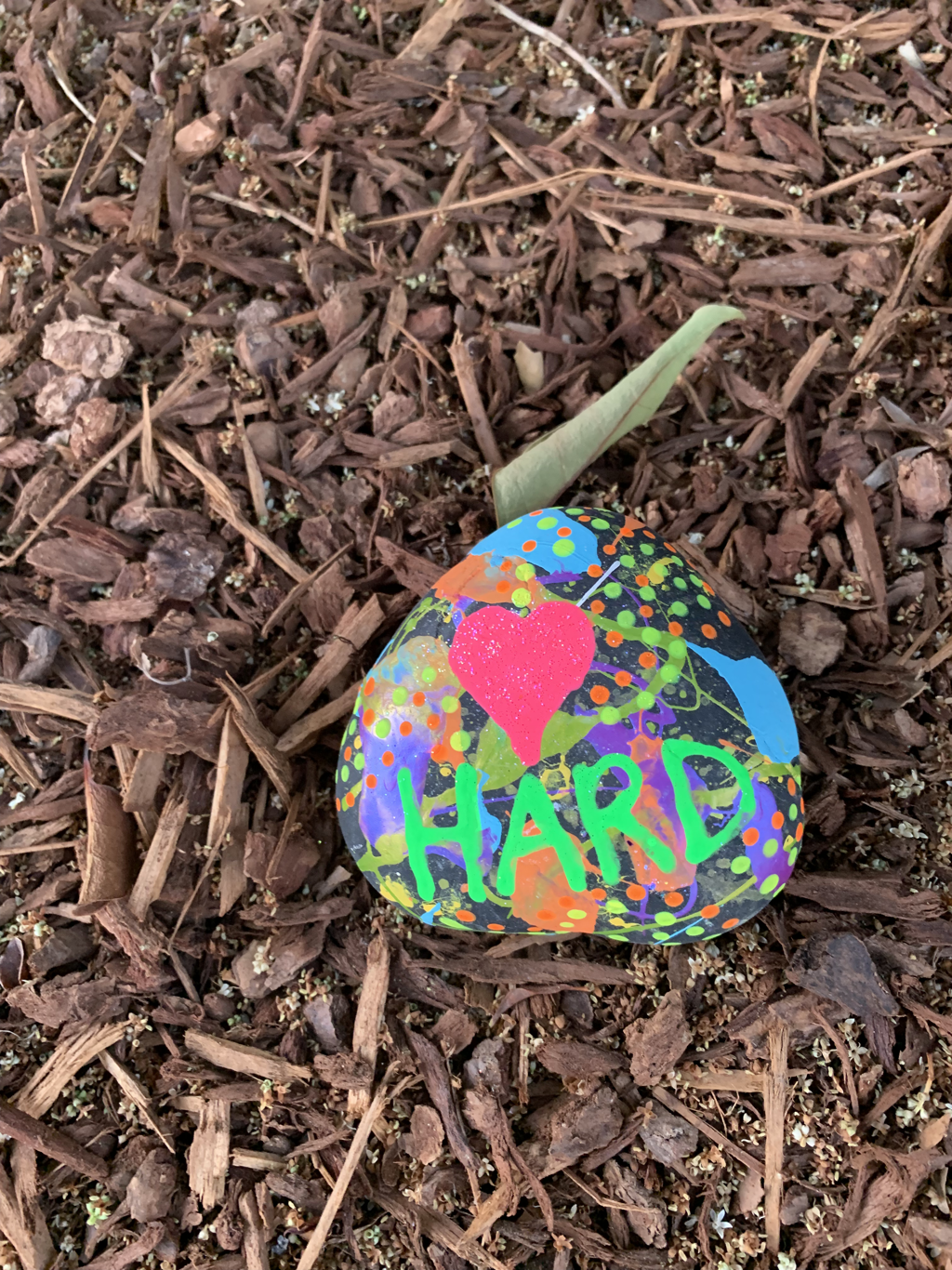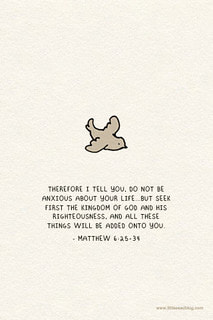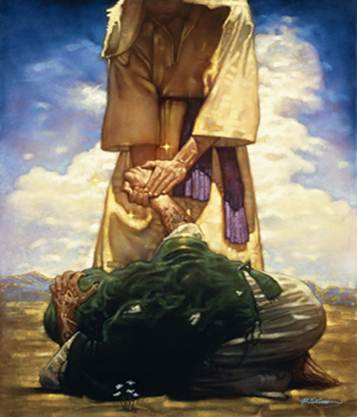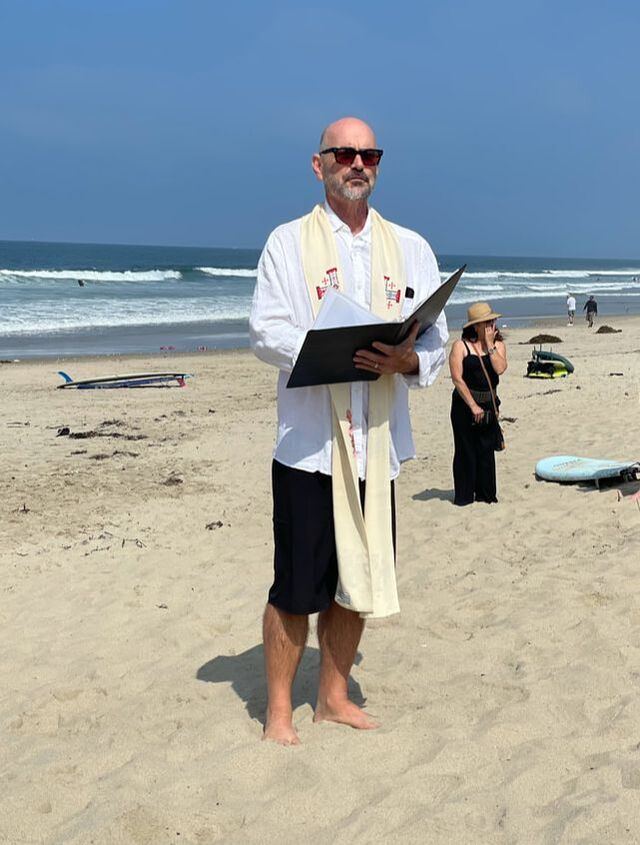“Not everyone who says to me, ‘Lord, Lord,’ will enter the kingdom of heaven, but only the one who does the will of my Father in heaven...Everyone then who hears these words of mine and acts on them will be like a wise man who built his house on rock. The rain fell, the floods came, and the winds blew and beat on that house, but it did not fall, because it had been founded on rock.
Those are not the easiest words to hear. Especially from the warm and fuzzy Jesus we love and trust. I suspect there are going to be a lot of disappointed people trying to enter the kingdom of heaven.
These last few weeks we’ve heard Jesus call us blessed, and then teach us a new way to live into our blessedness. He’s asked us to be the salt of the earth and the light of the world. To keep our eyes and hands fixed on doing God’s will, and to store our treasures in God’s heart. And again, last week he told us not to worry about what we did or need to do, but instead we are to focus on the here and now where life’s problems are plentiful. Then comes the hard truth. Hearing these words isn’t good enough. Like we saw a few weeks ago, not everyone wins gold at the Olympics. Some take home silver or bronze, but most go home empty handed. And that chance at medaling is only for those who are good enough to qualify. The ones who do the work to get there in the first place. Jesus said, not everyone who calls him Lord will enter the kingdom of heaven. Only those who hear his words and acts on them. Hearing and doing is the hallmark of Matthew’s understanding of discipleship. The two cannot be separated. If you want to see the kingdom of heaven come alive before your very eyes, then your head and heart must work together - trusting God and serving others by doing God’s will. So hear this: It’s not enough to hear what Jesus is saying. His words are meaningless to you and your faith, if you don’t act upon them. Just because have a perfect GPA and the highest SAT score, that doesn’t automatically get you into Harvard or Yale. Likewise, empty words and empty gestures will not get you the keys to the kingdom. I’m sure hearing this has stirred something up in the disciples, just like it might has stirred up something in me. They gave up their family and careers to follow him. To think it might be all for nought. It’s hard not to sweat a little here knowing you’ve been a devote Christian, and Jesus could still say, “I never knew you.” Or worse, he calls you an “evildoer.” But at the end of the day, it doesn’t matter what your lips confess if your heart doesn’t show it. This should make us all take a serious look at how your head and heart align with his.
Before you tune me out completely, let’s not forget Jesus began this lesson by blessing those who were with him. I believe that by our baptism, we received Jesus’ blessing too. What then will we do with it?
In these three chapters of Matthew’s gospel, Jesus teaches us roughly 35 specific lessons on what we are to do to live into our blessedness. But let me warn you, these lessons are easy to hear but they are also hard to do – especially if your head and heart are not in sync with each other or with his. Jesus says, “Some of you will hear these words of mine and not act on them.” I just hope that won’t be the case with me. Or that I won’t find out until it’s too late. Many years ago Kathleen said something that has stuck with me. She asked, “What if Jesus already came back, and we missed it? Or worse, didn’t believe it?” Seriously, what if Jesus has come up to you as a homeless man (because he was) and you ignored him? Or what if he was the baby crying in the arms of a teenage refugee seeking asylum in our country and you shut them out? I don’t know if that has happened already, but I do know this. Jesus said whenever you see and do “to the least of these, you do also to me.” Hearing and doing. That’s it. Why are there still many who miss that point. Or worse, choose to ignore it. There are still too many so-called Christians who are so self-absorbed that they see very little around them. There are plenty of Pharisees and Scribes still alive, preaching in Jesus’ name about God’s redemptive love, and yet forget to live out that love in the world. Jesus isn’t kidding when he says he won’t be pleased. Again, hear me when I say it’s not enough to hear or even speak the Word of God. You have to live it as if your life depended on it. Consider this our wake-up call as individuals and as the church. Jesus is giving us a stern warning to make sure that our actions and motives match what we’re saying. That our heads and hearts are in sync with our Lord who calls us all to follow him. We have no excuse not to. We’ve heard the word. And now we know what to do. Those first listeners on the mountain knew what they were supposed to do as well. Jesus wasn’t giving them a whole new set of rules to live by. He’s has already reminded them he didn’t come to abolish the laws, but to fulfill them, to help them live the life they knew more faithfully. The same is true for us. We have the words of Jesus, the very Word of God. But are we really listening to what he’s saying? Are we really doing what he is doing? Hearing and doing is the path to discipleship. The path that leads our head and heart towards God’s love and grace. You can say you have faith, but is that enough to enter the kingdom of heaven? Jesus has made it very clear that it’s not. A proper confession of faith must lead to a genuine practice of that faith. What good is your faith if it doesn’t transform and redeem you? Or move you to change your behavior, to love your neighbor and pray for your enemy? In his Epistle, the Apostle James writes, “What good is it if someone says they have faith but does not have works? Can that faith save them? Faith by itself, if it does not have works, is dead” (James 2:14) You see, faith isn’t something we confess once and then check off our list of things to do before we die. It’s a lifelong practice; a constant, daily action. I have learned that the more I practice my faith, the more visible the kingdom of heaven becomes, right here, right now. When my head and heart are fixed on doing the will of God, the kingdom comes to life, before my very eyes. I begin to see Jesus in the face of the other, and am moved to act accordingly. I do this not because I am trying to enter the kingdom of heaven, but because my heart is so aligned with Jesus’ heart that I can’t help but to mirror him. Henri Nouwen wrote, “In Jesus, no division existed between his words and his actions, between what he said and what he did. Jesus’ words were his action, his words were events. They not only spoke about changes, cures, new life, but they actually created them. In this sense, Jesus is truly the Word made flesh; in that Word all is created and by that Word all is re-created.” To his point, if I will truly live the words I speak from my heart, then “my spoken words become actions, and miracles would happen whenever I open my mouth.” Jesus has ushered in the kingdom of heaven, and has invited us to join him. The way we do that is to hear his words and act on them. Hear and believe. Hear and obey. This is how faith deepens, how miracles happen, and how God’s will is done on so no one is left out or uncared for. If you want enter into the kingdom of heaven, then you have to choose to participate in it. If you believe that Jesus means what he says, then you need to reorient your actions to mirror his – reflecting his thoughts and feelings as if they are your own. To hear him and be like him means to love as he loved; turn the other cheek; go the extra mile for others. It means being a person whose yes means yes and no means no. It means forgiving others - not just their sin but their debt as well. It means not seeking retaliation, or letting the sun go down on your anger, or allowing your lust to lead you astray. It means giving to everyone who begs and lending to all who ask. To have your head and heart with Christ is to walk and talk with intention and mercy and grace, treating others with kindness and not condemnation. This is what it means to be the salt and the light, a blessed one who hungers and thirsts for righteousness’s sake. Do these things, Jesus says, and not only will you see heaven appear in all its glory. But you will also hear our Lord say, “Welcome, blessed one. For the kingdom of heaven is yours.” Work Cited Bartlett, David L. and Barbara Brown Taylor, eds. Feasting on the Word, Year A. Vol 1, and Vol 3. (Louisville: Westminster John Knox, 2010 and 2011 respectively). Metz, Susanna E. Well, This Is A Rough. (episcopalchurch.org June 01, 2008). Accessed on August 25, 2021. Nouwen, Henri J.M. You are the Beloved. (San Francisco: Convergent, 2017)
0 Comments
This is my message to you today. I hope that you will not only read it but that you will also put it in the place from which is came - the heart. Step into the space between heaven and earth. Walk with intension. Keep your eyes open. Keep you heart open. Keep you mind open. As you, I pray that will see that there is beauty everywhere pointing the way for you to see, feel, and think. So go. Upward and onward. The journey is full of the goodness of life. Wherever you may be. There's a little garden across the street from the park near my house. Throughout the pandemic someone has placed these little creative markers to remind us how to be human and hopeful. Whenever I see them, I am reminded also that this world is a holy and sacred space. It's up to us to bring our blessedness into it. This is not always the easiest thing to do, especially given the difficult times we are experiencing in our nation and in the world. Which is why I am grateful for these little reminders on living life in love and mindfulness.
Update: While I was walking the dog yesterday, I saw a man (named AJ) nailing some art to a tree. I asked him if he was the artist who did these messages. He wasn't. But introduced me to who is doing them. Her name is Cassie, who decided to incorporate her two children to "love bomb" the park. They began doing it during lockdown as a way to share a positive message to those who might need it read it. I wonder if she knows just how many people need to read it. And how many, like me, walk with intention to find new signs. She and AJ have become friends because of this. Just another way how art and kindness often leads us towards friendship and love, the greatest art of all.
You can view AJ's art on Instagram: @lajparkart From time to time, I like to post someone else’s ideas. I, and a few million others, have been following Seth Godin daily for the last few years. He takes a different approach to education, and is know for his alternative MBA program and professional speaking. Because my last post was on “not worrying,” I found Seth’s words this week to offer us a alternative perspective of a similar topic. Enjoy: If we’re hungry, the obvious solution is to eat something. Seth Godin. Solving for Stress. Seth’s.blog August 24, 2021 (accessed on 08-25-21).
worry takes my focus off what I’m supposed to do. It causes me to think about what’s next, or what I did, instead of being present so the presence of God can shine through me.
.Now, I’d come to learn the unofficial term of what I did is called Bible Roulette. This is when someone, often a seminarian having a panic attack, challenges God to prove God’s self by opening the bible and randomly slamming their finger down on verse. That verse, of course, will be the answer they are looking for.
At the time I had no idea this was a real thing. I thought I had found a way to trick God. So I picked up the bible next to my bed, and as my head screamed one last time “How will I put shoes on their feet?”my finger hit the page, and this is what I read. “And why do you worry about clothing?” To ensure I got the message loud and clear, God directed my eyes to the title at the top of this passage from Matthew’s gospel, “A cure for anxiety.” That was it. God won. I fell on my knees and started to sob into my pillow. I just didn’t have the fight in me anymore. Once I surrendered, that tight grip on my heart was released. The stress that I had carried for decades melted away. And my life has never been the same since. “Why do you worry about clothing?” Jesus said these words in the middle of the Sermon on the Mount. And they come on the heels of what we talked about last week - how a healthy eye brings light into your entire being. Picking up from where left off, Jesus says this from Matthew 6:24-34.
One of the most repeated phrases in the entire bible is “Do not be afraid,” or a variation like, “Do not fear,” or “Do not worry,” which Jesus says four times in these few verses. It’s a phrase that is both familiar and foreign, and it hits us at a time when the world has given us so much worry about.
Another COVID variant, wars and civil unrest, fires on the west coast, hurricanes on the east coast, earthquakes, famines. It’s hard not have a little worry rattling about inside your head. When Jesus says “Don’t worry,” it could come off a little cliché, like something one says when they don’t think someone’s problem is worth getting worked up over. As Fiona was moving herself back to college I told her, “Don’t worry, you’ve got this.” When Colleen was nervous about returning to campus after a year and a half of school at home, I said “Don’t worry, you know where things are and what to expect.” And this past Friday, when Sean began his freshman year at a prestigious catholic high school, you know what I said to him? “Don’t get yourself kicked you out. They don’t give refunds.”
Saying don’t worry is one of my go to phrases. But sometimes saying it can do more harm than good. I mean, how do you tell a young woman who is fleeing from the Taliban not to worry? Or my friend who called me for some marriage advice, if I told her not to worry she would have known I wasn’t invested in her or her pain.
Throughout the Sermon on the Mount, Jesus is calling us into an alternative way of living in the world. A way that is focused on God’s righteousness and provision. He begins by saying you can’t serve two masters. It’s either God or money. He’s saying if our heart is focused on obtaining wealth, we will constantly be worrying about how much we have, or getting more of it. This is how the world invites us to live. Jesus said If our heart is on God’s righteousness, in good times and bad, then we have no reason to worry. Sounds easy, unless a single mom who has to choose between paying rent or feeding her kids. Here’s the thing. This parable isn’t about what money can buy. It’s about what God can provide. The question for us is simply: do you believe God is an intimated, caring, and a trustworthy parent who provides for all of us? All Jesus has to do is look at the birds flying around him, and the flowers and the grass on the mountainside, for the answer. He sees how everything is constantly under God's delicate, loving care. And tells his followers not to worry about what they will eat and wear because if this good God takes care of the least of these, then surely God will do the same for them. I know what you’re probably thinking. “This is just a little out of touch with reality.” And you're probably right. I mean doesn’t Jesus know that our world runs on money and consumerism. I have the credit card bills to prove it. Jesus knows we need things like food and clothing in order to get by in this world. He also knows we need air, and water, and gravity, and sunshine as well. Where do those things come from? God. The creator of it all: you, me, and everything. J Jesus points our attention towards the birds and the flowers because they are like us. They too are made by God’s divine hand. And they, like us, rely on God’s hand to provide for them without work or worry. If I have learned anything in my faith, it’s that worry always takes my focus off what I’m supposed to do. It causes me to think about what’s next, or what I did, instead of being present, right here and right now, so that the presence of God can shine through me. Jesus calls us into Anamesa, that space between heaven and earth, us and them, me and you, the space where life is unfolding with every second because “the Kingdom of Heaven has come near.” When you are worrying about the past or what tomorrow will bring, then you’re not focusing on God’s kingdom and all its righteousness that is happening all around you. Jesus says, “Don’t worry,” because where you are is where you need to be; where heaven comes alive here on earth. It’s here, in Anamesa, God comes to meet us. And we come to meet God in one another. Jesus invites us to open our eyes and our hearts to see God among us in every living thing - birds, trees, babies and even in our enemies. Once we wrap our head around this reality, there’s no need to worry. If our hearts are on God, then we know that we are under God's loving personal care. God will not leave us without resources or support, just as God has not abandoned the forest and oceans that we are destroying at a rapid pace. But as Jesus’ life and death taught us, God is in control. Out of death, God brings new life. This is good news for us because we can face life today with all its uncertainties and contingencies with the same assurance that was given to us with Christ’s empty tomb. God not only hears, sees, and cares about our us and our situation, but God also moves to help alleviate the stress it causes. After my first quarter of school, I put God to the test one more time. It happened while I was signing up for more classes, which meant more money. My severance from my old job was gone, and my unemployment had run out. I needed to come up with $4,000 to cover tuition. Instead of anger or using colorful words, I simply prayed “God, you promised me.” I had just uploaded up my tuition on the credit card when our doorbell rang. It was our mailman Rick, who loved to hang out and talk. After about 15 minutes or so, Rick hands me a stack of mail and leaves. In my hands were numerous envelops from churches around the country. In those envelops were different scholarship checks. Those checks totaled, $3,750. And you know what I said to God? “You’re $250 short. But don’t worry. I got it.” Yes, once again I tried to pull one over on God. That Sunday I had been invited to preach at our church. And wouldn’t you know it, when I got to the pulpit there was an envelope with my name on it. Inside was another check - for $250. Talk about divine provision. Now, I wished this happen all the time. But it does happen enough so I will never lose sight of where to keep my heart focused, on the One who put shoes on their feet. Jesus calls us to imagine the world differently, to see life through God’s eyes and to value the things that Jesus values, which includes you and me. He knows that we’ll face challenges and circumstance that will overwhelm us and cause us to worry and maybe have a panic attack or two. Thus, he encourages us to keep our eyes and hearts on God who looks out for the transient life of grass with such beauty and care. Just as God looks out for the least of these, so too does God look out for us who are faithful in the kingdom, standing up for what is right and just, and sharing all that we’ve been given knowing with our eyes and believing with our hearts that there is always enough of God’s love to go around. So let's go out into the world taking Jesus’s advice. Let’s not worry about tomorrow, today’s trouble is enough for today.” Instead, let's keep our focus on the Kingdom of God and all its righteousness. Because if Jesus means what he says, and if his word is true, then all things will be given to you.
“The eye is the lamp of the body. So, if your eye is healthy, your whole body will be full of light; but if your eye is unhealthy, your whole body will be full of darkness. If then the light in you is darkness, how great is the darkness!
Once again, Jesus uses light and darkness as metaphors to speak to the spiritual health of a person. And this “spiritual vision” is what keeps our souls in right relationships with God and others.
For example, when your focus is on the wealth and ways of the world, and not on what God is offering, then it’s like you’re pulling down a shade to shut out God’s light and all life that it brings. In my last post that I said, unless you’re a mushroom or mold, light is essential to life. Not only does it help us grow, but it helps us see, and to navigate the darkness be it physical, emotional, or spiritual. Jesus said, “If your eye is good your whole body will be full of light.” Somewhere around the age of 3 or 4, my nephew Lucas received his first set of glasses. This was big news, as it is with anyone who wears glasses. For the first time in his life, Lucas could see details, like individual leaves on trees and blades of grass, instead of just blurry blocks of color. Those glasses changed the way he saw things, including his worldview. He became more curious, and more aware of everything around him. Jesus is calling us to see the world with a new set of lenses, ones that help us see things we so often miss. When we gaze upon God’s light and love everything changes. We too begin to see all the little details that God has in store for us. There’s a great viral video of a man receiving a pair of sunglasses as a birthday gift. Judging the unimpressed reaction on his face, you’d think they were a pair of Ray-Ban knock offs. But his family encourage him to put them on, and when he does his entire demeanor changes. He gasps. Looking all around in utter disbelief, he’s laughing and crying at the same time – speechless because he can’t believe what he sees. He had gone 66 years without seeing color. You see, those were no ordinary glasses. But ones designed to help colorblind people see the world in all its vibrant glory. It’s amazing how one gift could change a person’s perspective on life forever. So too is the gift of Christ Jesus who said, “if your eye is good your whole body will be full of light.” But sometimes even people with perfect vision have trouble seeing the light of Christ as the gift that it is.
watch the message here
Most of us see people for what they appear to be, and we judge them accordingly. We see them as ordinary sunglasses and not the special creation they are.
Jesus sees us for who we are – beloved children made in God’s image. When Jesus sees a person in need, he feels their pain and moves to help them. That’s because Jesus sees the world brightly with the eyes of a compassionate heart. Luke tells a story about Jesus passing by a funeral procession (Luke 7:12-15). The people are carrying the body of a widows only son. Luke writes, “When the Lord saw her, his heart went out to her.” Jesus knew that this woman’s life depended on her son. He felt her pain and helped. He touched the bier they were carrying him on, and immediately the dead man was brought back to life and returned to his mother. A similar thing happened when Jesus saw two blind men crying out for help on the side of the road. And the woman begging for her daughter’s life, and the leper cast out from his community, and the demoniac left to die alone. Not to mention the crowds who constantly flocked to him to be healed. Jesus doesn’t avoid their gaze, but gazes upon them with the eyes of a compassionate heart. What about us? How do we see? Or better yet, who do we see? It’s not hard to imagine that if you were to see a crying child, you’d rush to help ease her pain. But what do we do when we see a man with mental illness begging on the side of road? Or a frightened immigrant too scared to ask for help? How do you see a person who wears a MAGA hat, or baggy, low hanging pants? “If your eye is healthy, your whole body will be full of light.” In his latest book The Universal Christ, Richard Rohr argues that what Jesus really wanted, was for us to “see the world with his eyes.” When we see the world with the same love and compassion as Jesus, our own world grows richer, deeper, and more loving. So, we must always keep our gaze on the One who is in us, and in everything around us, because according to Rohr, "everything we see is the outpouring of God for God is the light inside of everything." How we see, and who we see, is relative to how we will shine. This productive life that Jesus calls us into, begins by changing the way we see things. It begins with seeing life the way he does, looking through his eyes by turning away from the darkness and stepping into the light that is within us all. Jesus is the visible presence of God’s love incarnate. He sees faces and lives, situations and struggles and hurts. And is moved with compassion to love on them. Having been made in God’s image, we too are vessels by which God’s love is seen and felt in the world. Thus, the Apostle Paul calls us to be imitators of Christ – to see with the eyes of a compassionate heart – radiating God’s love. Think about it like this. Jesus looks out at a crowd of a thousand people and sees: Proud people, broken people, gay people, self-righteous church people, people who are addicts, workaholics, adulterers, tax-evaders, embezzlers, hypocrites, liars, thieves, people who are broken and hungry for more that the world offers, people like you and me. And when he sees us what does he do? He loves us as God loves him. He shows compassion not judgement. He teaches – rather than condemns. He sees past our sin to our condition and moves to help. This is our calling and what it means to follow Jesus. When you set your eye on him, you can’t help but see the divine light in all things and react accordingly. Your eye is a lamp that illuminates God’s love in you. Remember it was Jesus who said, “Let your light shine so that others can see your good works and give God glory.” (Mt. 5:16) By shining upon others, in all the ways you act in love, you show them how to flip the switch and turn on God’s light within themselves. But here’s the thing, if we want the light of Christ to shine through us, we need to turn our gaze away from the darkness of the world and put it upon him. Jesus helps us to clearly see the way of God’s love and righteousness. He is the light within us all that helps us see ourselves and others as we really are. But to see through Jesus’ eyes we must first see him for who he is: The incarnate and visible presence of God’s light and love that exposes the darkness and redeems the good. When we can see this, we are able to break out of our narrow, self-centered way of seeing others and get involved with the people around us. We notice them, acknowledge them, see them not as sinful creatures to avoid, but as God’s children, holy and beloved. Take the story of a notorious sinful woman who interrupted a dinner party to anoint Jesus with oil (Luke 7:36-50). When Simon the Pharisee quickly passed judgment on the situation, Jesus asked him, “Do you see this woman?” then he gave a list of reasons why she was more spiritually grounded than Simon! Simon had all the religious rules down, but this woman saw Jesus for who he was, and poured out her love upon him. (Roper) When we see the world through Jesus’ eyes, we can see a person for who they are and not judge them by what we think, or what they wear, or who they love, or how they vote, or where they’ve been, or what they’ve done. To borrow from Mother Theresa who loved to say, “I see Jesus in every human being. I say to myself, this is hungry Jesus, I must feed him. This is sick Jesus, I must tend to him.” As you go out into the world, I’d encourage you to look closely at the people in your community, your neighbors and co-workers and strangers alike. When you see them, hear Jesus asking, “Do you see that person the way I do? Do you realize that God made them too?” Jesus gives us the eyes of a compassionate heart so that we could not only see ourselves as he sees us, but to see others like he does, as brothers and sisters, not strangers and enemies. Jesus gives us the eyes of a compassionate heart so when we see injustice, we will have the desire to put an end to it. His eyes help us to see the world’s dark sin, so our hearts know where to radiate God’s light. He has given us eyes that see not only a broken person in need of help, but the horrific cross that repairs all damage. On that cross, Jesus opened his heart for the world to see God’s redeeming love in the flesh. A love that is given to all who want it. While the cross of Christ shifts our focus and changes our vision, it is the empty tomb of Christ that frees us to give our hearts willingly to everyone we see. And to do so as if we are giving it to Christ himself. Therefore, let us keep our eyes always upon the One who said, “If your eye is healthy, your whole body will be full of light.” Work Cited Rohr, Richard. The Universal Christ. (New York: Convergant, 2019). Roper, Mark. Seeing Through The Eyes of Jesus. sermoncentral.com. 12 12, 2009. (accessed 08 11, 2021). The Word This Week.com Eigth Sunday After Epipnany 02 26, 2017. (accessed 08 13, 2021).
There’s nothing else like the beach, and the salt air to cure whatever is ailing you. It’s a sanctuary for me. Whenever I’m feeling stressed or lost, I go to the beach knowing the ocean has the power to heal.
When we lived in Michigan, we’d go to Lake Michigan which for the most part could easily pass for an ocean. Except for one thing. The locals often brag about it, they sell t-shirts that say “Salt and Shark Free.” But every time I went in, something was missing. And it wasn’t the sharks. Salt might not be essential to enjoy a good swim, but it does define the uniqueness of an ocean. It also defines our uniqueness as followers of Christ. Today, I want to return to the mountain side, on the heels of Jesus blessing the crowd. The disciples listen carefully, ready to learn what it means to be a blessing in the world. And it’s here the Word of God uses these two analogies to enlighten them: Salt and light. READ: Matthew 5:13-16.
You are the salt. You are the light. Every time I read this passage, I think about one thing: my wife’s salt addiction.
Those of you who have ever opened a cupboard in our home would know what I mean. We do have your basic table salt. In fact, she carries some in her purse. But our everyday salt is imported from Australia. We also have red Spanish salt, blue Persian salt, two kinds of black salt from Hawaii, three different salts from Peru, and one from the Himalayan mountains. We also have lava salt, smoked salt, kosher salt, wine salt, and about a dozen more I know I’m forgetting. Each one of these salts are unique, but each one also has the distinct flavor – salt. If you were to call my wife salty, she’d take it as a complement. She knows its a good thing. After all, Jesus says salt is good, “but if salt has lost its saltiness, how can you season it?” It never dawned on me that all our salts could one day stop being salty. All I know about salt is that it’s essential to human life. It is the only trace mineral that’s found in every cell in the human body. Without it, we’d cease to function. If you don’t get enough, you increase your risk of heart attack, stroke, and cardiovascular disease. And too much can be toxic or lead to high blood pressure. Salt is good as long as it’s being used wisely. Maybe Jesus trying to tell us to not just sit there in the cupboard but go out and do what you’re supposed to do. Be the visible presence of God’s love in the world. Go spice it up with love. I also know that whenever I have a sore throat, I gargle with saltwater because it helps to reduce inflammation. If you have sore muscles or tired feet, nothing is more restorative than a good soak in a salt bath. Whenever I swim or surf in the ocean, the stress in my body just seems to disappear. Is Jesus using this analogy to remind us to go heal and restore the world? Is that what we’re supposed to do? If you think about it, love has that power, doesn’t it? Showing kindness to someone who is scared, or anxious, or lost can go a long way to healing them and restoring one’s soul and faith. Now couple of years ago my brother took me to a restaurant called “Salt” where each item on the menu was pared with a particular salt to enhanced the flavor of whatever you were eating. There was a different one for beef, and one for chicken, and different ones for specific vegetables. And even desserts. Maybe Jesus is comparing us to salt because he’s asking us to bring out the best in ourselves and the best in other people.
watch the message here
There are all different kinds of Christians – from fine to flakey – yet we all have a distinct, common purpose. That is to shake out the Good News of God’s redemptive love on everything. To love liberally to enhance the goodness of God in others. Too much of this is good for humans and the world. That is why it needs to be sprinkled over everything.
What good is our faith if we refuse to live it out like Jesus did? What good is love if we stop showing it to others? Fun fact: in 1st century Palestine once salt lost its flavor, it was then used as a weapon. Troops would spread on an enemy’s crops and ground to make the land barren. If there is no Christ in your Christianity, you run the risk doing more harm than good. We lose our saltiness every time we cheat a business partner, or refuse to forgive someone who has hurt us, or denied dignity to a stranger. We cannot lose our capacity to love. We must constantly be shaking it out by speaking up and standing up for what is right even if those in power crucify us for doing so. We cannot risk being losing our flavor, our faith and the love that it enhances. The best way to ensure that never happens is to constantly keep God’s love alive in us. It doesn’t matter if you’re a regular old table salt, or some exotic smoky sea salt, or even salt of a different color, the world needs to hear God’s Words because there is still so much darkness around us. Jesus says, “You are the salt of the earth.” But you are also the light that shines in the darkest of places. One of the only things I remember from high school biology class besides needing salt to live is that we also need light. Light is the main source of energy for all living organisms. Without it we would literally be nothing. Maybe mushrooms, or mold, but yuck! What then are we without God’s light? How well will we live if we remain only in the darkness? What would grow in us without God’s love filling us? We need light. God’s light. In John’s gospel, Jesus said, “I am the light of the world. Whoever follows me will not walk in darkness but will have the light of life.” Not only does this mean that we will grow well with him, but we will thrive. Through Christ, we become light bearers, illuminating God’s presence in the darkest of places every time we love another, especially those who do not know love or have not felt it for a very long time. When our kids were little, we had night lights throughout our house to give them comfort and to help them see their way in the night. But what good is a night light if it’s not plugged in? We are called to be the light of the world. Our light needs to cut through the darkness and guides people to God’s loving arms. But how? Just as the moon which has no light of its own but reflects what it receives from the sun, we receive our light from Jesus. And are called to reflect his light upon the world. To love as he loved, forgive as he forgave, care and heal and serve, as he did. Jesus didn’t discriminate, neither shall we. Jesus didn’t say because you are this way or that way, I won’t love you and care for your needs. He loved and cared for all. And he died for all. If there is no Christ in your Christianity, then you are only adding to the darkness that hangs over this world. To follow him is to reflect his light. And to shine brightly. Jesus says it’s imperative that we don’t hide our faith or spiritual gifts but to put them in the center of life – drawing people to its warmth and radiance. By being salt and light, we can live within our own Christ likeness without fearing how others might retaliate. We can enhance God’s goodness and illuminate God’s blessings in those dark places where love is lacking, forgiveness is needed, and where mercy and justice are missing. Salt and light. This is how we share the good news of our faith…by being faithful to it. This might require to be vulnerable and open to hurt. Which is never easy. Letting go of our power and hard exterior is difficult for many of us. But it’s how we take off the baskets that hide our light and we allow our goodness to be released. The hard ground cannot bear good fruit. Only when it is cracked open can the seed enter the expose, soft dirt and take root. God is calling you to go and be the salt and light of Christ in the world, to produce the goodness of the Kingdom of Heaven…be it at the beach, a lake, or wherever you are. To be like Christ is to let Christ shine through us so others can see their goodness in God’s glory and shine themselves. This is how Jesus fulfilled God’s righteousness and blessed the world and produced the good fruits of God’s love and grace. And this is how we, his followers, are to abide the same – loving God with all our heart, mind, and soul; and our neighbor as ourselves. We are his salt. Full of flavor and full of life. We carry his light that destroys the darkness. Let us go forth and shine brightly. Leading people safely home to the open arms of God’s unfailing love. Work Cited Bartlett, David L and Barbara Brown Taylor, eds. Feasting On The Word, Year A, Vol 1. (Louisville: Westminster John Knox, 2010) pp. 332-337. Lockyer, Herbert. All The Parables of the Bible. (Grand Rapids: Zondervan, 1963) pp. 146-147.
If you give a pig a pancake, she'll want some syrup to go with it. You'll give her some of your favourite maple syrup, and she'll probably get all sticky, so she'll want to take a bath. She'll ask you for some bubbles. When you give her the bubbles...
Virginia Woolf wrote, “For pleasure has no relish unless we share it.” And this wonderful children’s book seems to capture that spirit exactly.
I read this story because 1) I believe it’s the perfect illustration of what God’s love for us is like. Wherever we are or what situation we find ourselves in God is there, and ready to give us our hearts desire. But I also read it because I believe it also says something about who we are, and what our faith should look like. For the past few weeks, we’ve been learning about the Word of God. A Word that John’s gospel professes “became flesh and walked among us.” And then in Matthew’s gospel we heard what that Word has to say about who we are. Today I want us to look at what that means to us, and this community, now that we’ve heard the good news proclaimed. How can we share our faith with the reckless joy and tireless enthusiasm of this little girl who shares everything she has with her pet pig? She makes it look so effortless. As if it’s the natural thing to do. And for God, it is. But what about us? Imagine a world where we just automatically shared our faith without pause. To have such a giving spirit that people can’t help but see the goodness of God shine through. And when they do, perhaps they will want to know more. There’s a word for this. It’s called evangelism which comes from the Greek word “euangelion” which means “good news” or “gospel.” But I have also seen it defined as a “word that scares the crap out of Christians.” And rightly so. Many of us don’t like to share our pancakes, muchless our hearts. And when it comes to our faith, well like politics, there are just some things we don’t share in good company. Because it’s often tied to a particular politic or religious ideology, evangelism has become a kind of dirty word. It’s hard to see all its good points through all the negative that have become attached to it. Which is odd when you think about it because, in its broadest sense, evangelism is the work of those who are messengers of God’s good Word made manifest in Christ Jesus. Heck, it even has the word “angel” right in the middle of it so it can’t be that bad. Given what we’ve been enduring with the pandemic and the politics surrounding it, we sure could use a little good news. And who doesn’t want an angel hanging around? I’ve learned that when you see an angel, there’s a good chance you’re going to want to hear what they have to say. There’s another good book where this idea is found. In the book of Romans, Paul writes this. READ: ROMANS 10:11-17 ...the same Lord is Lord of all and is generous to all who call on him. For, “Everyone who calls on the name of the Lord shall be saved.” But how are they to call on one in whom they have not believed? And how are they to believe in one of whom they have never heard? And how are they to hear without someone to proclaim him? And how are they to proclaim him unless they are sent? As it is written, “How beautiful are the feet of those who bring good news!”...So faith comes from what is heard, and what is heard comes through the word of Christ. ~Romans 10:11-17~
In May of 2018, some 29 million people around the world watched Prince Harry wed Meghan Markle in Saint Georges Chapel. Amidst all of the royal pageantry, the presiding Bishop of the Episcopal Church, the most Reverend Michael Curry, preached a sermon of love and the good news of Christ’s Word for all to hear.
In that sermon Curry proclaimed, “If humanity ever captures the energy of love, it will be the second time in history that we have discovered fire.” Such powerful words to profess. Now, let me ask you this: When he spoke those words to all those people do you think he was nervous, knowing 29 million viewers were more interested in seeing Megan's wedding dress than what he had to say? Or was he convicted knowing that 29 million people would hear about the love of God; knowing that faith comes by hearing? I would bet it was the latter. Bishop Curry was given an opportunity to share the gospel and he took it. And it left people wanting more. It makes me wonder if we have the same conviction. Bishop Curry might preside over one of the biggest churches in the world, and yeah he has decades of preaching experience under his belt, but his call to share the gospel is no different than ours. The world is hungry, not for pancakes but for love. But how will they know where to find it if no one tells them or shows them the way? “How can people call for help if they don’t know who to trust? And how can they know who to trust if they haven’t heard of the One who can be trusted? And how can they hear if nobody tells them? And how is anyone going to tell them unless someone is sent to do it?” (MSG). Evangelism is not an option. And if you’re like me, that should make you squirm a little. You see, I’m not the kind of person who just walks up to someone and beats them into accepting my way of faith.
watch or listen to the message here
I remember driving home from work one evening and seeing a small group of people in my neighborhood going from house to house with bibles in one hand and pamphlets in the other. It was only a matter of time before they hit up our home.
No sooner had I walked in from the garage, a mother with her young daughter knocked on our door. Now the nervous look on the mother’s face was priceless when I answered the door still wearing my clerical collar. But it didn’t stop her kid from asking that old familiar question, “If you were to die tonight where would you go?” I could help myself by answering, “Hopefully in the ground.” Despite their feeble efforts, they were at least doing what God is asking of all of us – to share the good news of God’s redeeming love. Again, this is not optional. But thankfully, there’s no one-size fits all approach to doing it either. If you feel comfortable going door-to-door, good on you. But don’t worry if your comfort zone maxes out at only being able to post a meaningful bible verse on Facebook. That’s evangelizing. So too is telling a friend about the real struggles you’ve experienced in your faith journey. Or how going to church or following the way of Jesus helped you get your life back on track. Perhaps you’re better at showing your faith than speaking it. No problem. Evangelism is all about putting our faith into action. It happens when you march for justice. Or work to end discrimination. Or collect signatures to ban assault riffles. You preach the good news of Christ Jesus whenever you bring his light into someone’s darkness. Or when you’re generous with your kindness, patience, or your super delicious pancakes. You see, it’s not about HOW you evangelize. But WHEN. It’s a matter of willingness. The opportunities to share God’s love and grace arise all the time. But who’s going to do it if not you and I? Evangelism shouldn’t be a dirty word. It’s our mission, our goal, our way to participate in God’s kingdom right here in Anamesa...in that space between heaven and earth, us and them, you and me. It’s not supposed to scare the hell out of us, but to scare the hell out of hell itself. I don’t know what was going on in Bishop Curry head on the morning of the royal wedding. I don’t know if he was nervous. Or if anyone confessed Christ that day because of what he said. All I know is he did it, with his whole heart, knowing faith begins with hearing the gospel first. It wasn’t up to him to convert or “save” whoever was watching that day. That’s Jesus’ job. His, and our, job is to share the good news of Jesus Christ, the very Word of God. And to do so faithfully and freely. How we do it is up to us. God’s not looking for perfection, just participation. For some strange reason God has faith in us, and believes we can do it. It might not happen on international television. But it can happen in a kitchen, or a treehouse, or at work, in a bar, or anywhere you find yourself. And so, as you enter the world today, consider what your words and actions are saying about God. How are you allowing the light and love of Christ Jesus to shine through you? People are hungry for more than what this world can give. They are always listening and always watching out for it. When people see the way you speak love into their lives, there’s a good chance they will want more. Like the prophet said, “How blessed are the feet of those who bring the good news!” May God bless your lips, and your hands and heart as well. So that you will be an angel, in the flesh walking among us all in love and peace. Amen. Works Cited Bartlett, David L. and Barbara Brown Taylor, eds. Feasting on the Word Year A, Vol 3. (Louisville: Westminster John Knox, 2011) pp. 336-341. Numeroff, Laura. If You Give A Pig A Pancake. (New York: HarperCollins, 1998). |
Ian MacdonaldAn ex-copywriter turned punk rock pastor and peacemaker who dedicates his life to making the world a better place for all humanity. "that they all might be one" ~John 17:21“Prius vita quam doctrina.”
~ St. Thomas Aquinas (1225–1274) * “Life is more important than doctrine.”
Archives
June 2024
|

